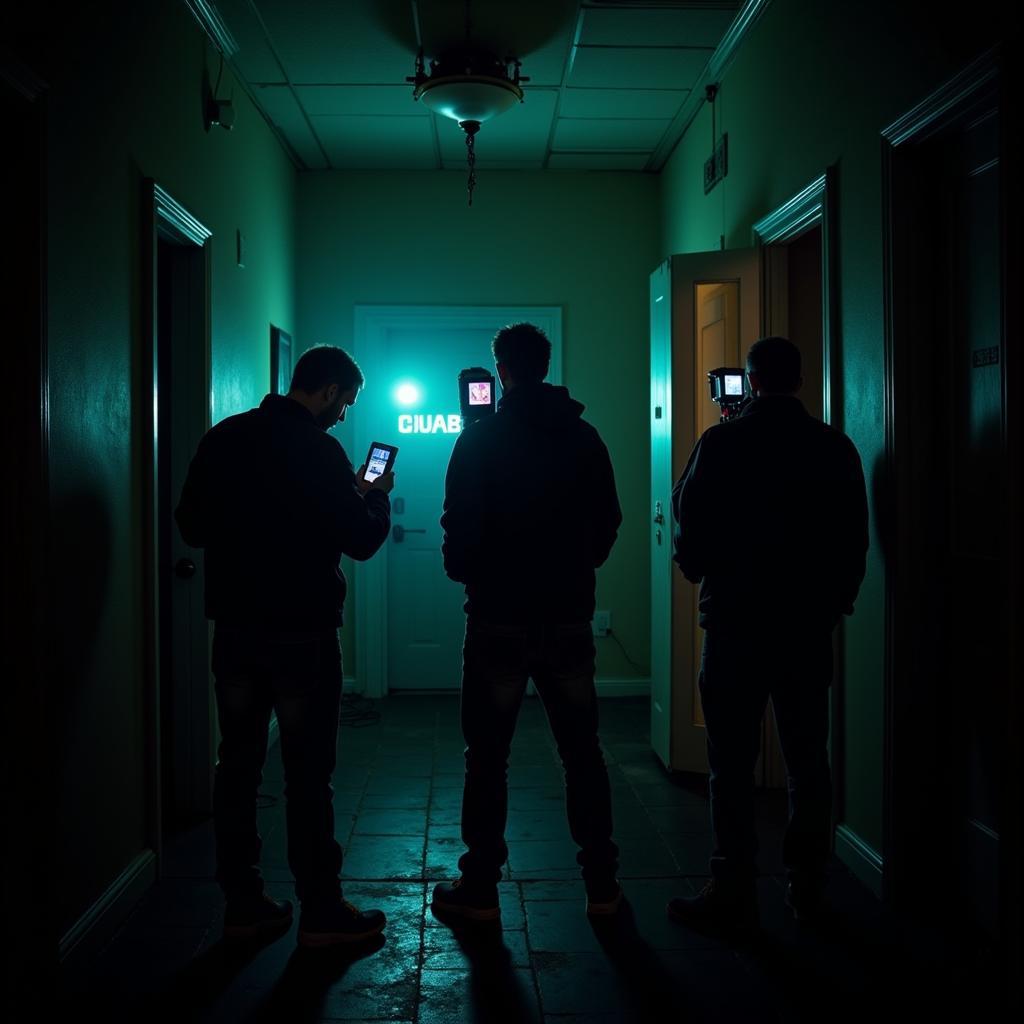Covert Research Or Reclamation often conjures images of shadowy figures and clandestine operations. But what exactly do these terms entail, and how do they intersect with the world of paranormal investigation? This article delves into the complexities of these concepts, exploring their practical applications and ethical considerations within the realm of the unknown.
Understanding Covert Research and Reclamation
Covert research, in its simplest form, involves gathering information discreetly, often without the knowledge or consent of the subjects involved. In the context of paranormal investigation, this might involve surveillance of a reportedly haunted location, or discreet interviews with individuals connected to a paranormal event. Reclamation, on the other hand, refers to the act of retrieving or recovering something. In a paranormal context, this could mean recovering an artifact from a haunted site, or even attempting to “reclaim” a location from perceived paranormal influence.
Ethical Considerations in Covert Paranormal Investigation
The ethical implications of covert research in paranormal investigations are significant. While the desire to understand the unknown is a powerful motivator, it’s crucial to balance this with respect for privacy and the potential impact on those involved. Undertaking covert surveillance, for instance, can raise serious ethical questions.
One key ethical dilemma arises when dealing with private property and individuals who may not wish to be involved in a paranormal investigation. It’s essential to obtain permission before conducting any research on private land, and to respect the wishes of individuals who decline to participate. Failing to do so not only compromises ethical standards but can also lead to legal repercussions.
The Practical Applications of Covert Research or Reclamation
Despite the ethical challenges, covert research can be a valuable tool in certain paranormal investigations. For example, if a witness is hesitant to speak openly about their experiences, discreet observation might provide crucial insights. Similarly, covert monitoring of a location might capture evidence that would be missed during a more overt investigation. Reclamation, while less frequently employed, can involve retrieving objects believed to be associated with paranormal activity, or conducting rituals aimed at neutralizing perceived negative energies.
One practical application of covert research is the use of hidden cameras and audio recorders to document paranormal activity. These tools can provide valuable evidence that might be missed during a traditional investigation. However, it’s crucial to ensure that any surveillance conducted is ethical and legal.
Is Covert Research or Reclamation Necessary?
Whether covert research or reclamation is truly necessary in paranormal investigation is a subject of ongoing debate. While proponents argue that these methods can uncover evidence that traditional methods miss, critics raise concerns about ethical boundaries and the potential for misinterpretation of data. Ultimately, the decision to employ these techniques should be made on a case-by-case basis, carefully weighing the potential benefits against the ethical and legal ramifications.
One alternative to covert research is engaging with the community and building trust. Open communication and collaboration can often yield more valuable information than clandestine methods. Furthermore, it fosters a more ethical and respectful approach to paranormal investigation.
What if I Suspect Paranormal Activity?
If you suspect paranormal activity, the first step should always be to gather as much information as possible. Document any unusual occurrences, including dates, times, and specific details. Consider consulting with experienced paranormal investigators who can offer guidance and support. Remember, understanding the unknown requires a balanced approach that prioritizes ethical considerations and respects the boundaries of others.
 Paranormal Investigation Team Conducting Research
Paranormal Investigation Team Conducting Research
Conclusion: Navigating the Ethical Landscape of Covert Research or Reclamation
Covert research or reclamation in the paranormal field presents a complex ethical dilemma. While these methods can potentially yield valuable insights, they must be employed with extreme caution and respect for the privacy and well-being of others. Balancing the pursuit of knowledge with ethical considerations is paramount in ensuring responsible and credible paranormal investigation. Remember, the ultimate goal is to understand the unknown, not to exploit it.
FAQ
- Is covert research legal in paranormal investigations? Legality depends on the specific methods used and local laws. Always prioritize obtaining consent and respecting privacy.
- What are the ethical concerns surrounding reclamation in a paranormal context? Reclamation, especially involving artifacts or locations, can raise cultural sensitivity and ownership issues.
- Are there alternatives to covert research in paranormal investigations? Open communication, community engagement, and traditional investigative methods are often more ethical and effective.
- What should I do if I suspect paranormal activity in my home? Document the occurrences, gather information, and consult with experienced paranormal investigators.
- Is covert research always necessary for a successful paranormal investigation? No, covert research is not always necessary and should only be considered as a last resort after exploring other avenues.
- Can covert research be used to disprove paranormal claims? Yes, covert research can sometimes provide evidence that contradicts initial claims of paranormal activity.
- What are the potential risks of engaging in covert research? Risks include legal repercussions, ethical violations, and potential harm to individuals involved.
Common Scenarios and Questions
-
Scenario: Strange noises are heard consistently in an old building. Question: How can covert research be used to determine the source of the noises without disturbing potential paranormal activity?
-
Scenario: A witness claims to have seen a ghostly figure in their home. Question: How can covert observation be used to verify the witness’s claims while respecting their privacy?
Further Reading & Related Articles
- “The Ethics of Paranormal Investigation” (link to hypothetical article on your site)
- “Understanding the Basics of Paranormal Research” (link to hypothetical article on your site)
If you need assistance, please contact us: Phone: 0904826292, Email: research@gmail.com or visit our office: No. 31, Alley 142/7, P. Phú Viên, Bồ Đề, Long Biên, Hà Nội, Việt Nam. We have a 24/7 customer support team.